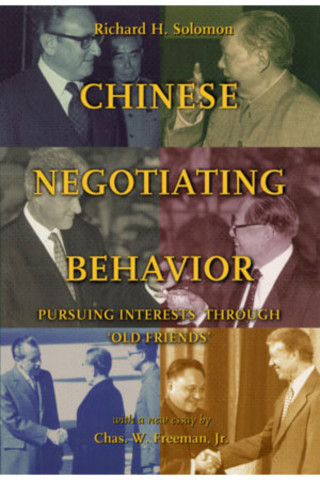Chinese Negotiating Behavior
After two decades of hostile confrontation, China and the United States initiated negotiations in the early 1970s to normalize relations. Senior officials of the Nixon, Ford, Carter, and Reagan administrations had little experience dealing with the Chinese, but they soon learned that their counterparts from the People’s Republic were skilled negotiators.
This study of Chinese negotiating behavior explores the ways senior officials of the PRC—Mao Zedong, Zhou Enlai, Deng Xiaoping, and others—managed these high-level political negotiations with their new American “old friends.” It follows the negotiating process step by step, and concludes with guidelines for dealing with Chinese officials.
Originally written for the RAND Corporation, this study was classified because it drew on the official negotiating record. It was subsequently declassified, and RAND published the study in 1995. For this edition, Solomon has added a new introduction, and Chas Freeman has written an interpretive essay describing the ways in which Chinese negotiating behavior has, and has not, changed since the original study. The bibiliography has been updated as well.
Richard H. Solomon
Richard H. Solomon was president of the United States Institute of Peace from 1993 to 2012 and oversaw its growth into a center of international conflict management analysis and applied programs.
Prior to this assignment, Solomon was assistant secretary of state for East Asian and Pacific affairs from 1989 to 1992. He negotiated the Cambodia peace treaty, the first United Nations “Permanent Five” peacemaking agreement; had a leading role in the dialogue on nuclear issues between the United States and South and North Korea; helped establish the Asia-Pacific Economic Cooperation initiative; and led U.S. negotiations with Japan, Mongolia, and Vietnam on important bilateral matters. In 1992-93, Solomon served as U.S. ambassador to the Philippines. He coordinated the closure of the U.S. naval bases and developed a new framework for bilateral and regional security cooperation.
Solomon previously served as director of policy planning at the Department of State and as a senior staff member of the National Security Council. In 1995, Solomon was awarded the State Department’s Foreign Affairs Award for Public Service, and he has received awards for policy initiatives from the governments of Korea and Thailand. In 2005, he received the American Political Science Association’s Hubert H. Humphrey career award for “notable public service by a political scientist.”
Solomon began his career as professor of political science at the University of Michigan, and also served as head of the Political Science Department at the RAND Corporation. Solomon holds a Ph.D. in political science, with a specialization in Chinese politics, from the Massachusetts Institute of Technology.

